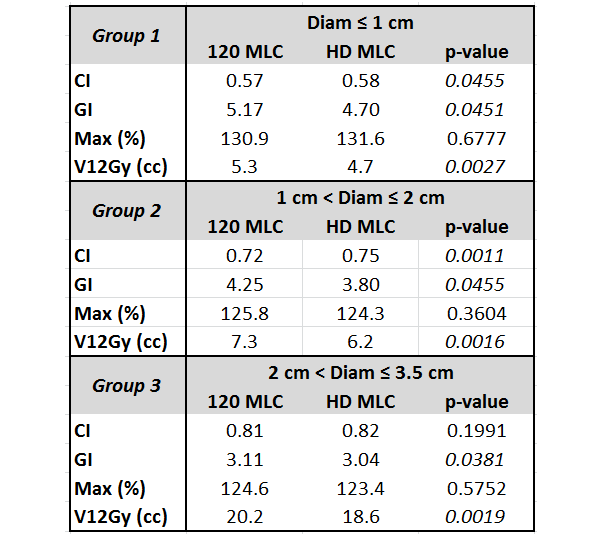Comparison of two MLCs for SRS HyperArc plans
Juan-Francisco Calvo-Ortega,
Spain
PO-1523
Abstract
Comparison of two MLCs for SRS HyperArc plans
Authors: Juan-Francisco Calvo-Ortega1, SANDRA MORAGUES-FEMENÍA1, CORAL LAOSA-BELLO1
1HOSPITAL QUIRÓNSALUD BARCELONA, ONCOLOGÍA RADIOTERÁPICA, BARCELONA, Spain
Show Affiliations
Hide Affiliations
Purpose or Objective
Aim:
To compare SRS plans calculated with the Varian
HyperArc (HA) technique and two types of MLCs.
Material and Methods
Materials and Methods:
Twenty five SRS (thirty nine lesions) cases planned using the Varian 120 MLC (5 mm width central leaves) were retrospectively planned using the Varian High Definition (HD) MLC (2.5 mm width central leaves). The number of lesions per case ranged from 1 to 5. Lesion diameter ranged from 8 to 33 mm. A single-isocenter plan was designed for each case with 6 MV FFF photon beams from a Truebeam linac.
For each case, both plans were planned with the HA technique, by using same beams arrangements and same objectives and priorities during the optimization task. Once established the objectives and their priorities, the optimization was done automatically without human interaction. Dose distributions were calculated (grid size of 1 mm) with the Acuros XB algorithm of the Eclipse v 16.10.
Lesions were classified in groups according to the diameter: diam ≤ 1 cm, 1 cm < diam ≤ 2 cm and 2 cm < diam ≤ 3 cm. The following dosimetric metrics were compared (120 MLC vs. HD MLC): Paddick conformity index (CI), Paddick gradient index (GI), maximum dose (Dmax) and V12Gy to the normal brain. A 2 tailed Student t-test (α= 0.05) were done for each metric.
Results
RESULTS:
Table 1 shows the metric comparisons for the lesions.
Statistically significant differences were observed in the GI and V12Gy values in favor of HD MLC, irrespective the lesion size. HD MLC provided statistically better CI for lesions with diameter <2 cm. No statistically significant differences were found for Dmax.

Conclusion
CONCLUSIONS:
Although the HD MLC-based HA plans were statistically better than the 120 MLC-based HA ones, small differences were found in the metrics analyzed in this study.